Social networks in Russia, summer 2013: numbers, trends, forecasts
Hi, Habr!
Our project is growing by leaps and bounds and by the hour and has grown to create a whole corporate blog! During the year of our existence, we have managed to accumulate serious experience in the development of Online Big Data (OBD) class systems and are pleased to share it with you. Since our blog is a consortium of various industrial teams, the topics of publications will be very diverse - from design to linguistics, from sociological research to systems engineering, from analytics to marketing.
And we would like to start with an article about the dynamics of social media penetration in Russia and about our forecasts for the near future of social media, which we will be able to test together in six months. In the first 6 months of 2013, the number of public messages in Russian-speaking social media increased 1.5 times and amounted to about 300 million per month, and the average monthly number of authors of public messages increased by 4 million people.
According to the FOM, as of June 2013, the share of the Internet audience — these are going online at least once a day — now makes up 57% of the population (+ 5% in 6 months). The annual growth of Internet users connecting to the network at least once a month was 11%, while for the daily audience this figure is 14%.
')
The most popular social network is vk.com, for the month it is visited by about 50 million people. In second place - Classmates - 43 million monthly visitors.
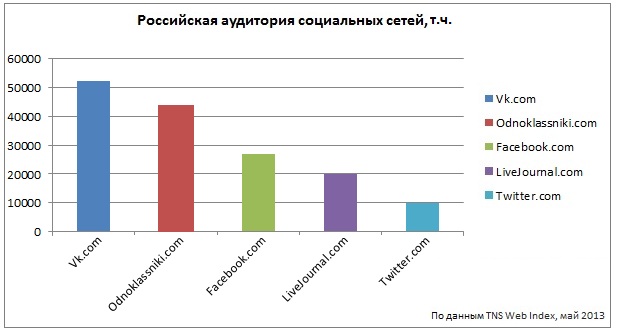
The number of open messages published in Russian-speaking social media per month has increased almost one and a half times since the beginning of the year, and is about 300 million. About 10 million posts, comments, tweets and other public messages are published daily.
Among the sources, the ratio of the number of weekly published Russian-language messages is approximately the following (only public messages, private conversations are not counted):
The average weekly number of unique Russian authors who post messages in social media (both the authors of posts and the authors of comments are taken into account) according to Brand Analytics :
Thus, for one Vkontakte author, on average, there are about 2 public messages, in LJ about 5, and on Twitter 6 messages per day.
According to the TNS Web Index , the average number of social media visitors per week in May 2013 was as follows:
The ratio of the active audience and social media visitors is as follows:
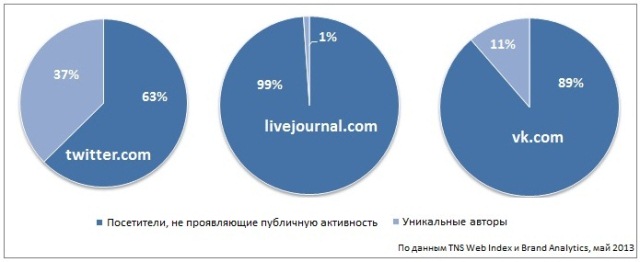
These data confirm the tendency of the Living Journal to turn into the media - visitors who leave at least one post or comment per week in LJ - just over 1% of the total audience.
Active authors on Twitter are almost 40%, and this is a record figure in social media, and the trend of growth of twitter remains. The average weekly number of Russian Twitter users is increasing as follows:
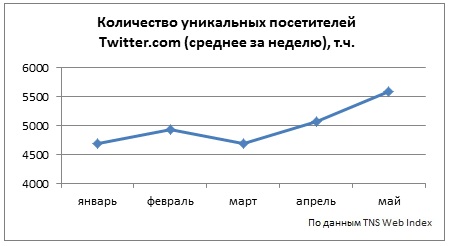
Together with the number of users, the number of tweets increases:

Thus, the second trend, the growth of Twitter and its influence, is confirmed. Despite the statements about the decline in the rate of growth of Twitter on an international scale, in Russia the number of fans of microblogging continues to grow quite actively.
The main social network in Russia, as before, vk.com. It is difficult to say how to change the picture after the active struggle against pirate music started on Vkontakte, but for the last six months the number of visitors, active authors and open publications has been consistently high.

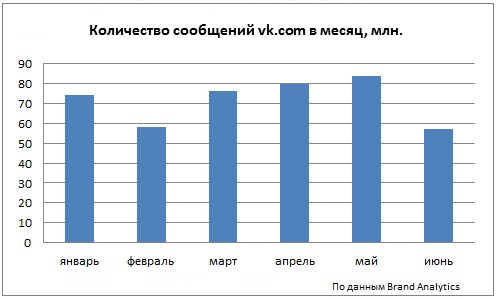
The following main development trends can be distinguished:
Have our forecasts been confirmed? Obviously, yes: social media is growing, growing and will continue to grow!
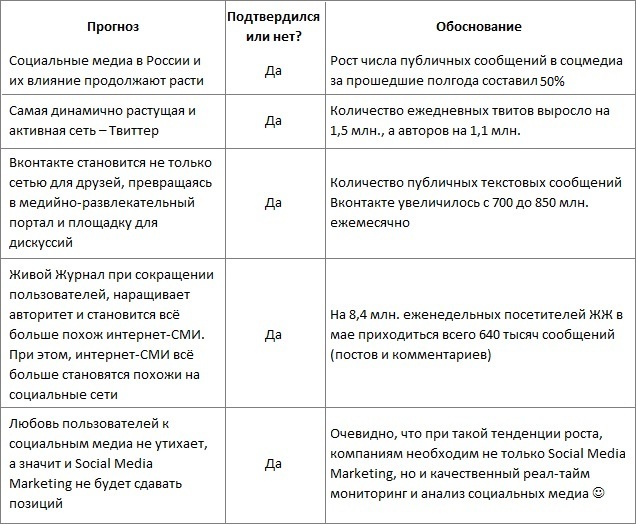
Several development trends for the next six months, which we would like to point out:
Thus, the transformation of LJ in online media, and online media in the social network is in full swing, waiting for further strengthening of the trend
By the way, last time we referred to an article in which Western experts predicted the transition from simple social media monitoring to complex analysis and forecasting systems based on this analysis as a trend-2013. Then we mentioned that the trend is quietly reaching Russia, and so what? We were right! Remember how this spring Russian sociologists hit the world professional community with the most accurate forecast of the results of elections in Venezuela based on the analysis of Spanish-language Twitter messages! The future is somewhere near;)
Our project is growing by leaps and bounds and by the hour and has grown to create a whole corporate blog! During the year of our existence, we have managed to accumulate serious experience in the development of Online Big Data (OBD) class systems and are pleased to share it with you. Since our blog is a consortium of various industrial teams, the topics of publications will be very diverse - from design to linguistics, from sociological research to systems engineering, from analytics to marketing.
And we would like to start with an article about the dynamics of social media penetration in Russia and about our forecasts for the near future of social media, which we will be able to test together in six months. In the first 6 months of 2013, the number of public messages in Russian-speaking social media increased 1.5 times and amounted to about 300 million per month, and the average monthly number of authors of public messages increased by 4 million people.
According to the FOM, as of June 2013, the share of the Internet audience — these are going online at least once a day — now makes up 57% of the population (+ 5% in 6 months). The annual growth of Internet users connecting to the network at least once a month was 11%, while for the daily audience this figure is 14%.
')
The most popular social network is vk.com, for the month it is visited by about 50 million people. In second place - Classmates - 43 million monthly visitors.

The number of open messages published in Russian-speaking social media per month has increased almost one and a half times since the beginning of the year, and is about 300 million. About 10 million posts, comments, tweets and other public messages are published daily.
Among the sources, the ratio of the number of weekly published Russian-language messages is approximately the following (only public messages, private conversations are not counted):
- Vkontakte: 13 million messages
- Twitter: 37.5 million posts
- LiveJournal: 640 thousand posts
The average weekly number of unique Russian authors who post messages in social media (both the authors of posts and the authors of comments are taken into account) according to Brand Analytics :
- Vkontakte: 4.7 million unique authors
- Twitter: 2 million unique authors
- LiveJournal: 90 thousand unique authors
Thus, for one Vkontakte author, on average, there are about 2 public messages, in LJ about 5, and on Twitter 6 messages per day.
According to the TNS Web Index , the average number of social media visitors per week in May 2013 was as follows:
- Vkontakte: 41.5 million unique visitors
- Twitter: 5.5 million unique visitors
- LiveJournal: 8.4 million unique visitors
The ratio of the active audience and social media visitors is as follows:

These data confirm the tendency of the Living Journal to turn into the media - visitors who leave at least one post or comment per week in LJ - just over 1% of the total audience.
Active authors on Twitter are almost 40%, and this is a record figure in social media, and the trend of growth of twitter remains. The average weekly number of Russian Twitter users is increasing as follows:

Together with the number of users, the number of tweets increases:

Thus, the second trend, the growth of Twitter and its influence, is confirmed. Despite the statements about the decline in the rate of growth of Twitter on an international scale, in Russia the number of fans of microblogging continues to grow quite actively.
The main social network in Russia, as before, vk.com. It is difficult to say how to change the picture after the active struggle against pirate music started on Vkontakte, but for the last six months the number of visitors, active authors and open publications has been consistently high.


The following main development trends can be distinguished:
- The number of users of social media in Russia continues to grow, and the number of active authors and readers increases.
- Twitter remains the most actively growing network.
- The number of public posts and discussions on Vkontakte also remains consistently high.
Have our forecasts been confirmed? Obviously, yes: social media is growing, growing and will continue to grow!

Several development trends for the next six months, which we would like to point out:
- In the summer months, we will observe the traditional decline in the number of public activities of social media users, on average by 30%. But at the beginning of the fall, the social networks will start growing again, and by the end of the year we hope to see a significant increase in the number of public messages and active authors.
- Despite some panic caused by the anti-piracy activity of the Vkontakte social network, we are confident that this network will remain the most popular among Russians, respectively, neither the outflow of users nor the drop in the number of public messages we expect.
- As for the sharp June decline in the number of public messages on Vkontakte, it is caused not only by the holidays and vacations of working people, but also by the blocking of several large communities that have been the victim of a virtual racket. Some of them are already banned from the ban, others are expected to withdraw the ban in the near future, so there is a high probability that an increase in the number of public messages will begin in July.
- Twitter will remain the fastest growing social network in Russia, at least until the end of the year.
- The number of readers and commentators of LiveJournal will probably remain at the same level, but a reduction in the number of posts is possible.
By the way, did you know that there are almost as many comments on many news portals as in LJ? And top news, as a rule, gaining more comments than top blog posts. The most activity of commentators is marked on news.rambler.ru, news.mail.ru and reuters.com. News on the Rambler - the undisputed leader in the number of comments to the news - about 120 thousand comments a week appear on this portal. Also a high number of comments are typed articles on ria.ru, kommersant.ru, championat.com, gazeta.ru, rbc.ru and itar-tass.com.
Thus, the transformation of LJ in online media, and online media in the social network is in full swing, waiting for further strengthening of the trend
By the way, last time we referred to an article in which Western experts predicted the transition from simple social media monitoring to complex analysis and forecasting systems based on this analysis as a trend-2013. Then we mentioned that the trend is quietly reaching Russia, and so what? We were right! Remember how this spring Russian sociologists hit the world professional community with the most accurate forecast of the results of elections in Venezuela based on the analysis of Spanish-language Twitter messages! The future is somewhere near;)
Source: https://habr.com/ru/post/186422/
All Articles